MPH Internship Report: Analyzing Public Health Experience and Skills
VerifiedAdded on 2022/11/11
|7
|1607
|372
Report
AI Summary
This report presents a reflection on an MPH student's internship experience, focusing on the practical application of public health principles. The student, who interned at a health facility in Australia, details their clinical duties, including immunizations, STD treatment, and international travel services. The report highlights the development of essential skills such as patient communication, cultural awareness, and competency in handling various clinical scenarios. It explores the influence of the MPH module on the student's understanding of public health policy and disease prevention, particularly in relation to children's health, maternity services, and infectious disease control. The student emphasizes the importance of creating a positive patient-specialist relationship and the ability to provide quality care. The report also discusses the student's future goals in promoting disease prevention, utilizing knowledge gained from the MPH program, and the role of competency standards in public health practice. The student concludes by highlighting the benefits of the MPH module in bridging theoretical knowledge with practical solutions and recommends prioritizing quality patient care.
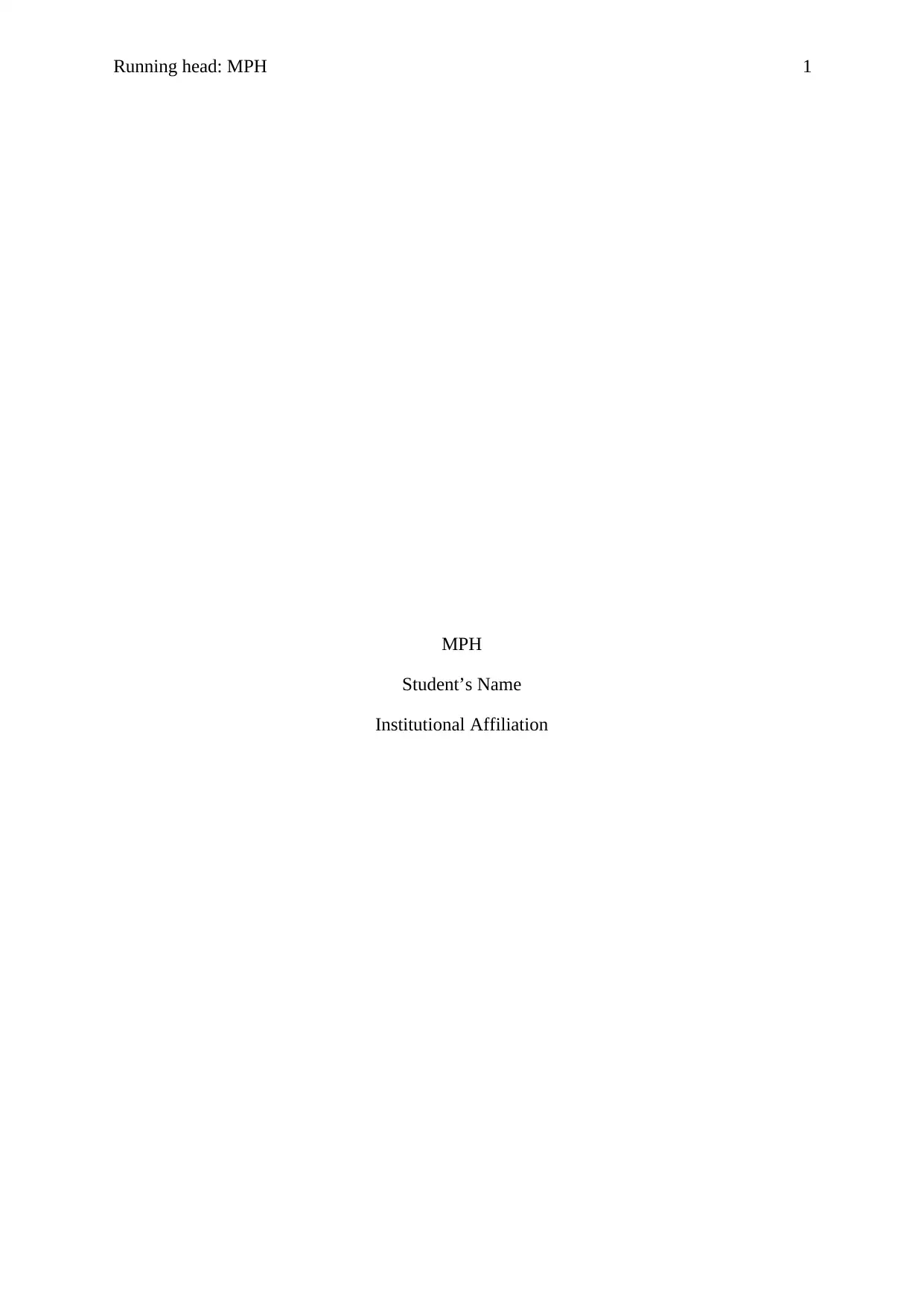
Running head: MPH 1
MPH
Student’s Name
Institutional Affiliation
MPH
Student’s Name
Institutional Affiliation
Paraphrase This Document
Need a fresh take? Get an instant paraphrase of this document with our AI Paraphraser
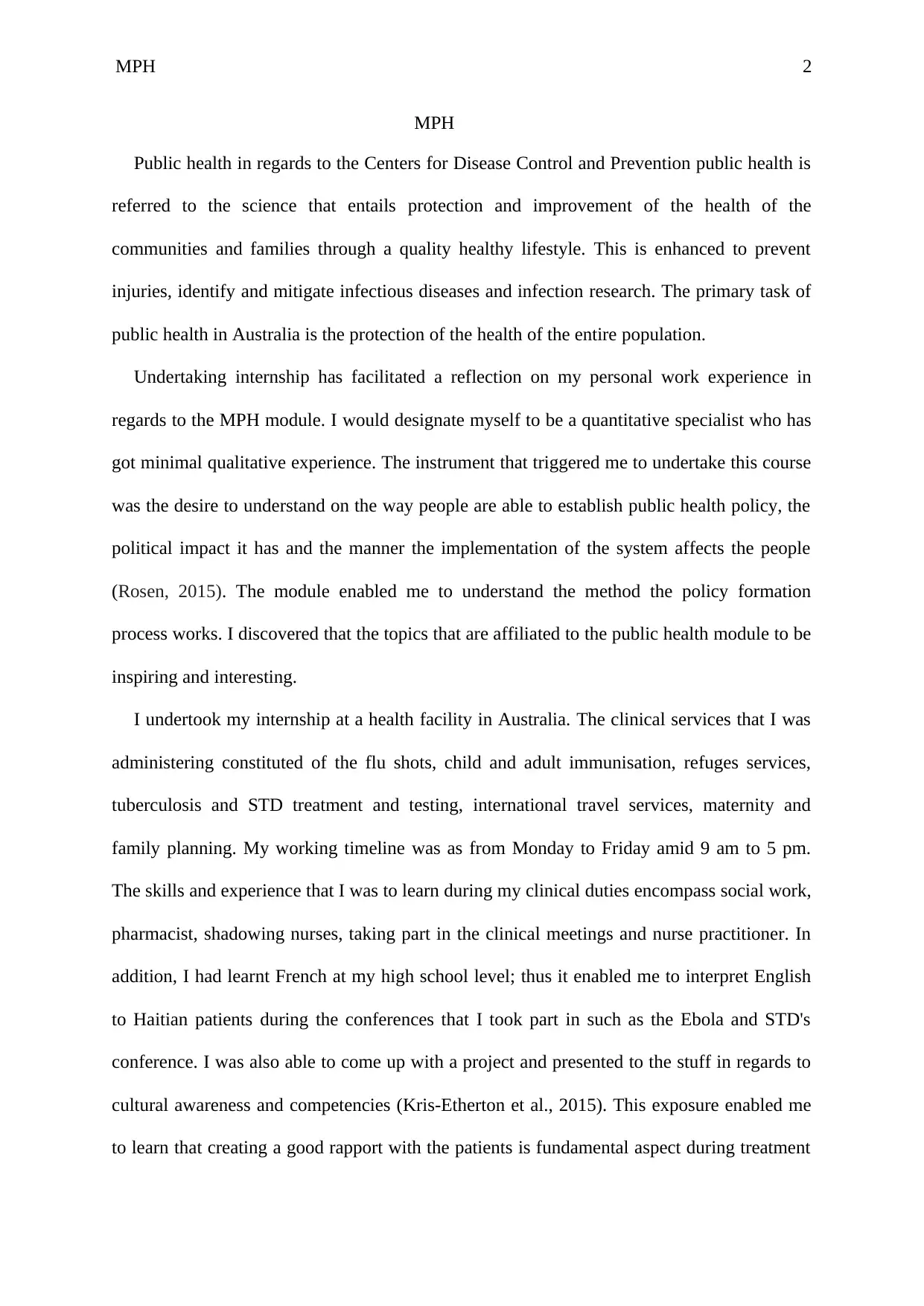
MPH 2
MPH
Public health in regards to the Centers for Disease Control and Prevention public health is
referred to the science that entails protection and improvement of the health of the
communities and families through a quality healthy lifestyle. This is enhanced to prevent
injuries, identify and mitigate infectious diseases and infection research. The primary task of
public health in Australia is the protection of the health of the entire population.
Undertaking internship has facilitated a reflection on my personal work experience in
regards to the MPH module. I would designate myself to be a quantitative specialist who has
got minimal qualitative experience. The instrument that triggered me to undertake this course
was the desire to understand on the way people are able to establish public health policy, the
political impact it has and the manner the implementation of the system affects the people
(Rosen, 2015). The module enabled me to understand the method the policy formation
process works. I discovered that the topics that are affiliated to the public health module to be
inspiring and interesting.
I undertook my internship at a health facility in Australia. The clinical services that I was
administering constituted of the flu shots, child and adult immunisation, refuges services,
tuberculosis and STD treatment and testing, international travel services, maternity and
family planning. My working timeline was as from Monday to Friday amid 9 am to 5 pm.
The skills and experience that I was to learn during my clinical duties encompass social work,
pharmacist, shadowing nurses, taking part in the clinical meetings and nurse practitioner. In
addition, I had learnt French at my high school level; thus it enabled me to interpret English
to Haitian patients during the conferences that I took part in such as the Ebola and STD's
conference. I was also able to come up with a project and presented to the stuff in regards to
cultural awareness and competencies (Kris-Etherton et al., 2015). This exposure enabled me
to learn that creating a good rapport with the patients is fundamental aspect during treatment
MPH
Public health in regards to the Centers for Disease Control and Prevention public health is
referred to the science that entails protection and improvement of the health of the
communities and families through a quality healthy lifestyle. This is enhanced to prevent
injuries, identify and mitigate infectious diseases and infection research. The primary task of
public health in Australia is the protection of the health of the entire population.
Undertaking internship has facilitated a reflection on my personal work experience in
regards to the MPH module. I would designate myself to be a quantitative specialist who has
got minimal qualitative experience. The instrument that triggered me to undertake this course
was the desire to understand on the way people are able to establish public health policy, the
political impact it has and the manner the implementation of the system affects the people
(Rosen, 2015). The module enabled me to understand the method the policy formation
process works. I discovered that the topics that are affiliated to the public health module to be
inspiring and interesting.
I undertook my internship at a health facility in Australia. The clinical services that I was
administering constituted of the flu shots, child and adult immunisation, refuges services,
tuberculosis and STD treatment and testing, international travel services, maternity and
family planning. My working timeline was as from Monday to Friday amid 9 am to 5 pm.
The skills and experience that I was to learn during my clinical duties encompass social work,
pharmacist, shadowing nurses, taking part in the clinical meetings and nurse practitioner. In
addition, I had learnt French at my high school level; thus it enabled me to interpret English
to Haitian patients during the conferences that I took part in such as the Ebola and STD's
conference. I was also able to come up with a project and presented to the stuff in regards to
cultural awareness and competencies (Kris-Etherton et al., 2015). This exposure enabled me
to learn that creating a good rapport with the patients is fundamental aspect during treatment
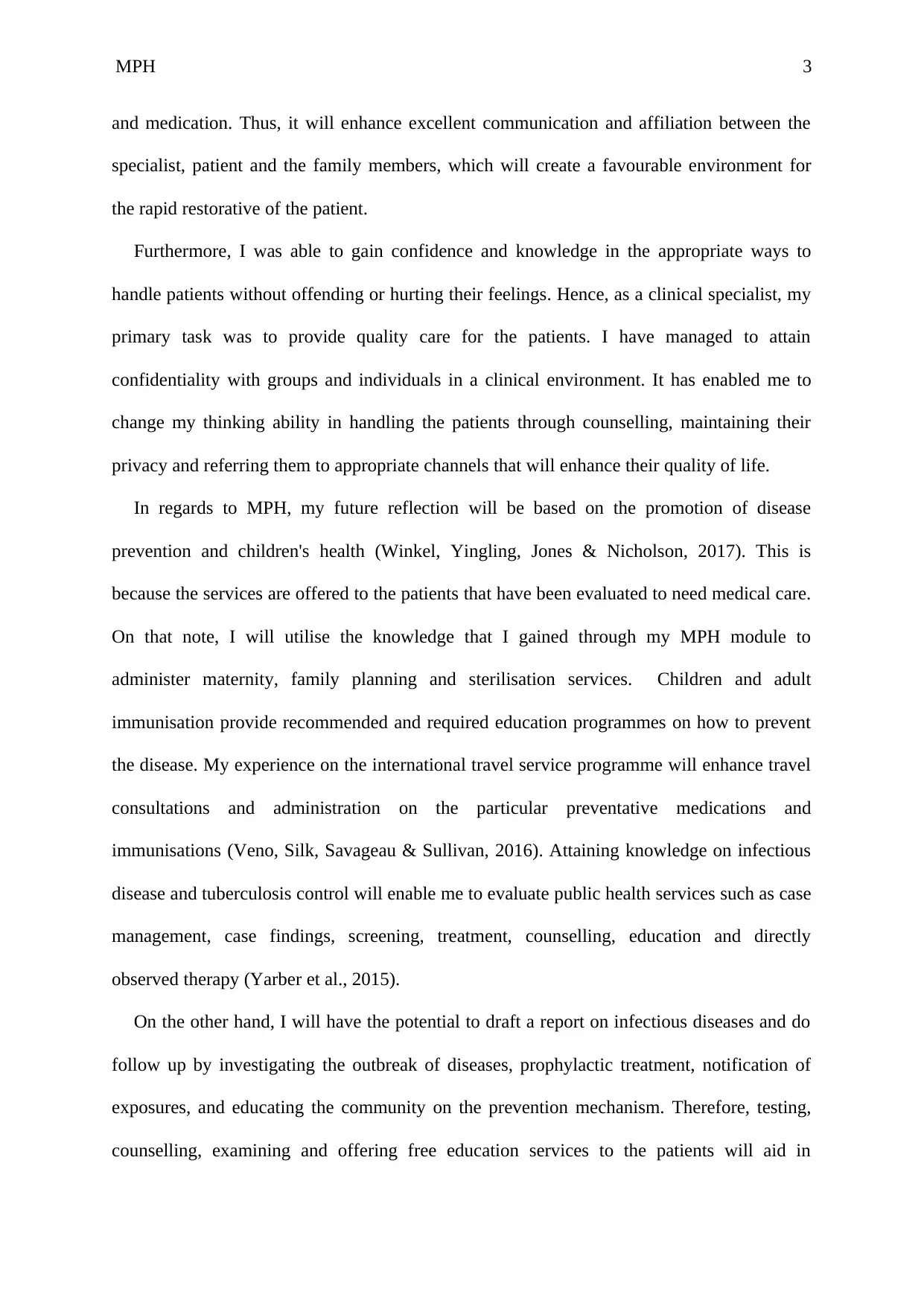
MPH 3
and medication. Thus, it will enhance excellent communication and affiliation between the
specialist, patient and the family members, which will create a favourable environment for
the rapid restorative of the patient.
Furthermore, I was able to gain confidence and knowledge in the appropriate ways to
handle patients without offending or hurting their feelings. Hence, as a clinical specialist, my
primary task was to provide quality care for the patients. I have managed to attain
confidentiality with groups and individuals in a clinical environment. It has enabled me to
change my thinking ability in handling the patients through counselling, maintaining their
privacy and referring them to appropriate channels that will enhance their quality of life.
In regards to MPH, my future reflection will be based on the promotion of disease
prevention and children's health (Winkel, Yingling, Jones & Nicholson, 2017). This is
because the services are offered to the patients that have been evaluated to need medical care.
On that note, I will utilise the knowledge that I gained through my MPH module to
administer maternity, family planning and sterilisation services. Children and adult
immunisation provide recommended and required education programmes on how to prevent
the disease. My experience on the international travel service programme will enhance travel
consultations and administration on the particular preventative medications and
immunisations (Veno, Silk, Savageau & Sullivan, 2016). Attaining knowledge on infectious
disease and tuberculosis control will enable me to evaluate public health services such as case
management, case findings, screening, treatment, counselling, education and directly
observed therapy (Yarber et al., 2015).
On the other hand, I will have the potential to draft a report on infectious diseases and do
follow up by investigating the outbreak of diseases, prophylactic treatment, notification of
exposures, and educating the community on the prevention mechanism. Therefore, testing,
counselling, examining and offering free education services to the patients will aid in
and medication. Thus, it will enhance excellent communication and affiliation between the
specialist, patient and the family members, which will create a favourable environment for
the rapid restorative of the patient.
Furthermore, I was able to gain confidence and knowledge in the appropriate ways to
handle patients without offending or hurting their feelings. Hence, as a clinical specialist, my
primary task was to provide quality care for the patients. I have managed to attain
confidentiality with groups and individuals in a clinical environment. It has enabled me to
change my thinking ability in handling the patients through counselling, maintaining their
privacy and referring them to appropriate channels that will enhance their quality of life.
In regards to MPH, my future reflection will be based on the promotion of disease
prevention and children's health (Winkel, Yingling, Jones & Nicholson, 2017). This is
because the services are offered to the patients that have been evaluated to need medical care.
On that note, I will utilise the knowledge that I gained through my MPH module to
administer maternity, family planning and sterilisation services. Children and adult
immunisation provide recommended and required education programmes on how to prevent
the disease. My experience on the international travel service programme will enhance travel
consultations and administration on the particular preventative medications and
immunisations (Veno, Silk, Savageau & Sullivan, 2016). Attaining knowledge on infectious
disease and tuberculosis control will enable me to evaluate public health services such as case
management, case findings, screening, treatment, counselling, education and directly
observed therapy (Yarber et al., 2015).
On the other hand, I will have the potential to draft a report on infectious diseases and do
follow up by investigating the outbreak of diseases, prophylactic treatment, notification of
exposures, and educating the community on the prevention mechanism. Therefore, testing,
counselling, examining and offering free education services to the patients will aid in
⊘ This is a preview!⊘
Do you want full access?
Subscribe today to unlock all pages.

Trusted by 1+ million students worldwide
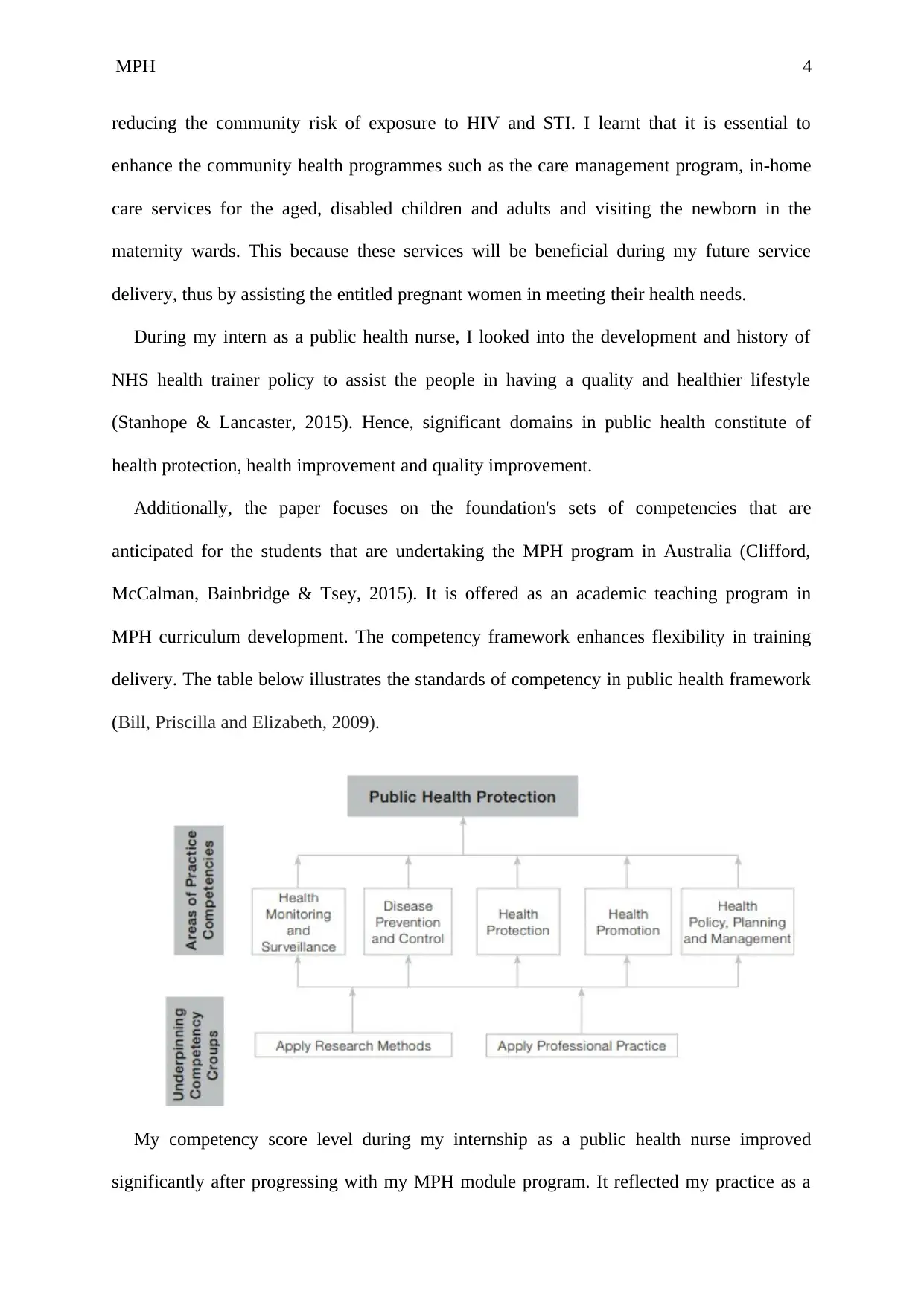
MPH 4
reducing the community risk of exposure to HIV and STI. I learnt that it is essential to
enhance the community health programmes such as the care management program, in-home
care services for the aged, disabled children and adults and visiting the newborn in the
maternity wards. This because these services will be beneficial during my future service
delivery, thus by assisting the entitled pregnant women in meeting their health needs.
During my intern as a public health nurse, I looked into the development and history of
NHS health trainer policy to assist the people in having a quality and healthier lifestyle
(Stanhope & Lancaster, 2015). Hence, significant domains in public health constitute of
health protection, health improvement and quality improvement.
Additionally, the paper focuses on the foundation's sets of competencies that are
anticipated for the students that are undertaking the MPH program in Australia (Clifford,
McCalman, Bainbridge & Tsey, 2015). It is offered as an academic teaching program in
MPH curriculum development. The competency framework enhances flexibility in training
delivery. The table below illustrates the standards of competency in public health framework
(Bill, Priscilla and Elizabeth, 2009).
My competency score level during my internship as a public health nurse improved
significantly after progressing with my MPH module program. It reflected my practice as a
reducing the community risk of exposure to HIV and STI. I learnt that it is essential to
enhance the community health programmes such as the care management program, in-home
care services for the aged, disabled children and adults and visiting the newborn in the
maternity wards. This because these services will be beneficial during my future service
delivery, thus by assisting the entitled pregnant women in meeting their health needs.
During my intern as a public health nurse, I looked into the development and history of
NHS health trainer policy to assist the people in having a quality and healthier lifestyle
(Stanhope & Lancaster, 2015). Hence, significant domains in public health constitute of
health protection, health improvement and quality improvement.
Additionally, the paper focuses on the foundation's sets of competencies that are
anticipated for the students that are undertaking the MPH program in Australia (Clifford,
McCalman, Bainbridge & Tsey, 2015). It is offered as an academic teaching program in
MPH curriculum development. The competency framework enhances flexibility in training
delivery. The table below illustrates the standards of competency in public health framework
(Bill, Priscilla and Elizabeth, 2009).
My competency score level during my internship as a public health nurse improved
significantly after progressing with my MPH module program. It reflected my practice as a
Paraphrase This Document
Need a fresh take? Get an instant paraphrase of this document with our AI Paraphraser
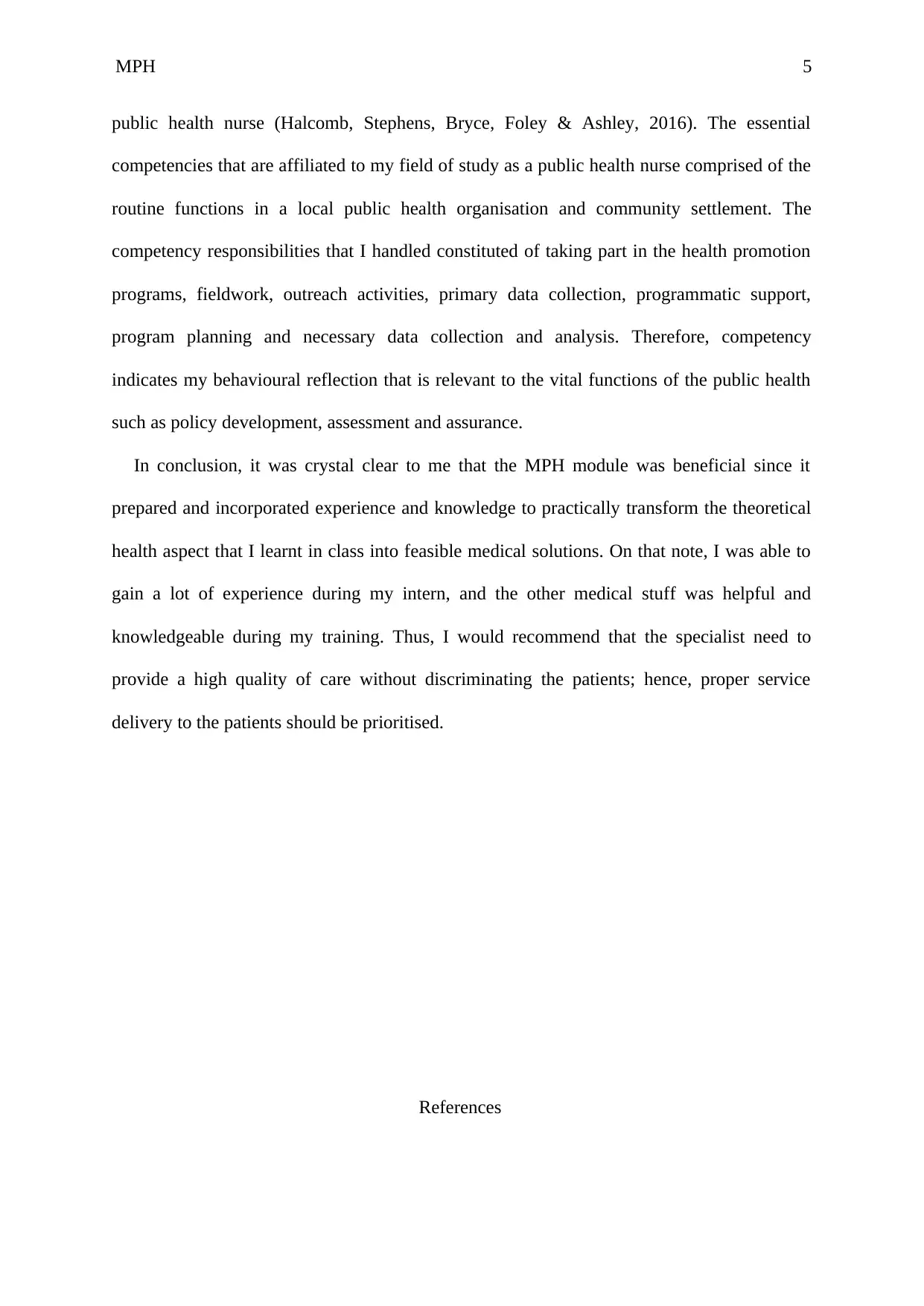
MPH 5
public health nurse (Halcomb, Stephens, Bryce, Foley & Ashley, 2016). The essential
competencies that are affiliated to my field of study as a public health nurse comprised of the
routine functions in a local public health organisation and community settlement. The
competency responsibilities that I handled constituted of taking part in the health promotion
programs, fieldwork, outreach activities, primary data collection, programmatic support,
program planning and necessary data collection and analysis. Therefore, competency
indicates my behavioural reflection that is relevant to the vital functions of the public health
such as policy development, assessment and assurance.
In conclusion, it was crystal clear to me that the MPH module was beneficial since it
prepared and incorporated experience and knowledge to practically transform the theoretical
health aspect that I learnt in class into feasible medical solutions. On that note, I was able to
gain a lot of experience during my intern, and the other medical stuff was helpful and
knowledgeable during my training. Thus, I would recommend that the specialist need to
provide a high quality of care without discriminating the patients; hence, proper service
delivery to the patients should be prioritised.
References
public health nurse (Halcomb, Stephens, Bryce, Foley & Ashley, 2016). The essential
competencies that are affiliated to my field of study as a public health nurse comprised of the
routine functions in a local public health organisation and community settlement. The
competency responsibilities that I handled constituted of taking part in the health promotion
programs, fieldwork, outreach activities, primary data collection, programmatic support,
program planning and necessary data collection and analysis. Therefore, competency
indicates my behavioural reflection that is relevant to the vital functions of the public health
such as policy development, assessment and assurance.
In conclusion, it was crystal clear to me that the MPH module was beneficial since it
prepared and incorporated experience and knowledge to practically transform the theoretical
health aspect that I learnt in class into feasible medical solutions. On that note, I was able to
gain a lot of experience during my intern, and the other medical stuff was helpful and
knowledgeable during my training. Thus, I would recommend that the specialist need to
provide a high quality of care without discriminating the patients; hence, proper service
delivery to the patients should be prioritised.
References
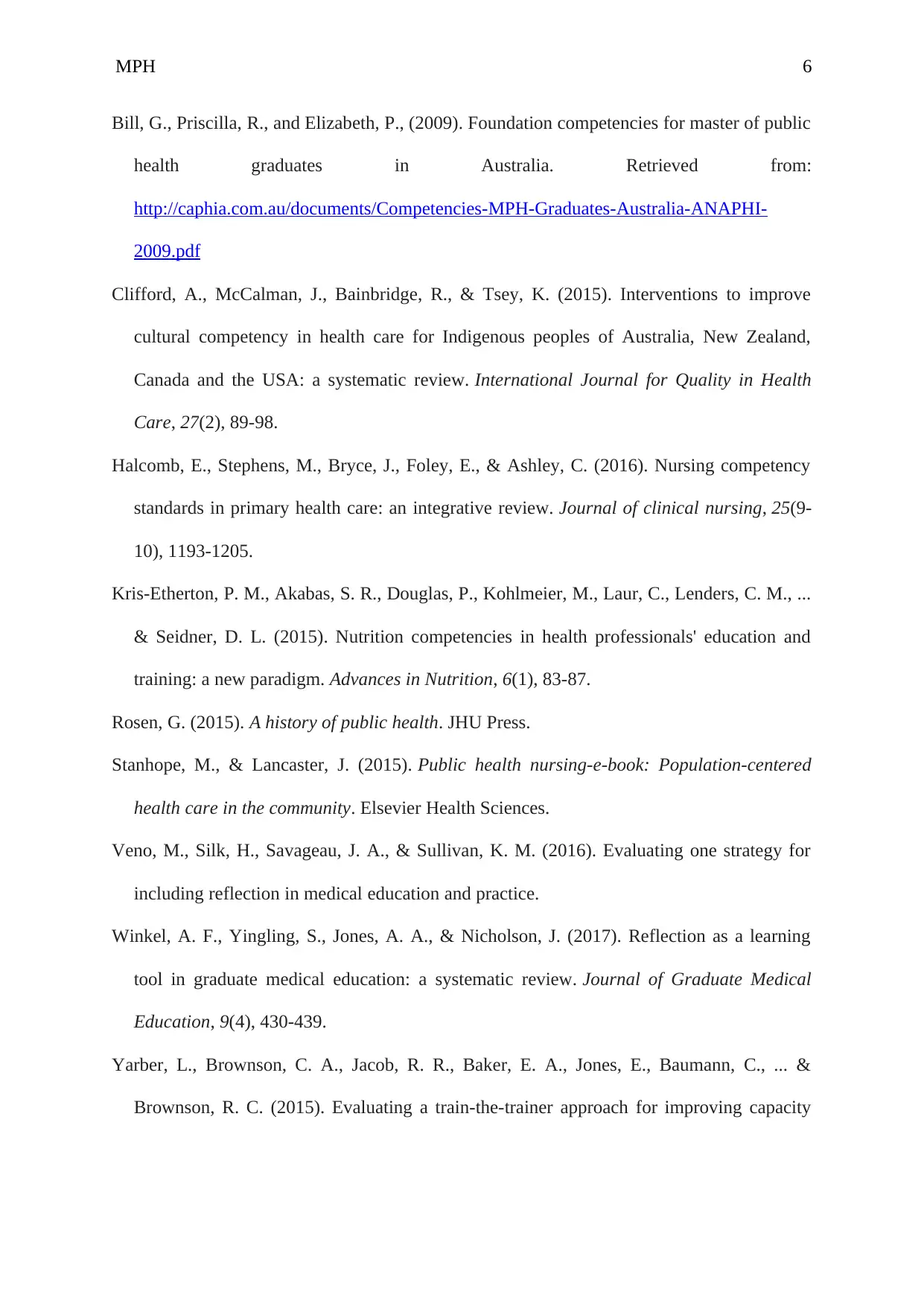
MPH 6
Bill, G., Priscilla, R., and Elizabeth, P., (2009). Foundation competencies for master of public
health graduates in Australia. Retrieved from:
http://caphia.com.au/documents/Competencies-MPH-Graduates-Australia-ANAPHI-
2009.pdf
Clifford, A., McCalman, J., Bainbridge, R., & Tsey, K. (2015). Interventions to improve
cultural competency in health care for Indigenous peoples of Australia, New Zealand,
Canada and the USA: a systematic review. International Journal for Quality in Health
Care, 27(2), 89-98.
Halcomb, E., Stephens, M., Bryce, J., Foley, E., & Ashley, C. (2016). Nursing competency
standards in primary health care: an integrative review. Journal of clinical nursing, 25(9-
10), 1193-1205.
Kris-Etherton, P. M., Akabas, S. R., Douglas, P., Kohlmeier, M., Laur, C., Lenders, C. M., ...
& Seidner, D. L. (2015). Nutrition competencies in health professionals' education and
training: a new paradigm. Advances in Nutrition, 6(1), 83-87.
Rosen, G. (2015). A history of public health. JHU Press.
Stanhope, M., & Lancaster, J. (2015). Public health nursing-e-book: Population-centered
health care in the community. Elsevier Health Sciences.
Veno, M., Silk, H., Savageau, J. A., & Sullivan, K. M. (2016). Evaluating one strategy for
including reflection in medical education and practice.
Winkel, A. F., Yingling, S., Jones, A. A., & Nicholson, J. (2017). Reflection as a learning
tool in graduate medical education: a systematic review. Journal of Graduate Medical
Education, 9(4), 430-439.
Yarber, L., Brownson, C. A., Jacob, R. R., Baker, E. A., Jones, E., Baumann, C., ... &
Brownson, R. C. (2015). Evaluating a train-the-trainer approach for improving capacity
Bill, G., Priscilla, R., and Elizabeth, P., (2009). Foundation competencies for master of public
health graduates in Australia. Retrieved from:
http://caphia.com.au/documents/Competencies-MPH-Graduates-Australia-ANAPHI-
2009.pdf
Clifford, A., McCalman, J., Bainbridge, R., & Tsey, K. (2015). Interventions to improve
cultural competency in health care for Indigenous peoples of Australia, New Zealand,
Canada and the USA: a systematic review. International Journal for Quality in Health
Care, 27(2), 89-98.
Halcomb, E., Stephens, M., Bryce, J., Foley, E., & Ashley, C. (2016). Nursing competency
standards in primary health care: an integrative review. Journal of clinical nursing, 25(9-
10), 1193-1205.
Kris-Etherton, P. M., Akabas, S. R., Douglas, P., Kohlmeier, M., Laur, C., Lenders, C. M., ...
& Seidner, D. L. (2015). Nutrition competencies in health professionals' education and
training: a new paradigm. Advances in Nutrition, 6(1), 83-87.
Rosen, G. (2015). A history of public health. JHU Press.
Stanhope, M., & Lancaster, J. (2015). Public health nursing-e-book: Population-centered
health care in the community. Elsevier Health Sciences.
Veno, M., Silk, H., Savageau, J. A., & Sullivan, K. M. (2016). Evaluating one strategy for
including reflection in medical education and practice.
Winkel, A. F., Yingling, S., Jones, A. A., & Nicholson, J. (2017). Reflection as a learning
tool in graduate medical education: a systematic review. Journal of Graduate Medical
Education, 9(4), 430-439.
Yarber, L., Brownson, C. A., Jacob, R. R., Baker, E. A., Jones, E., Baumann, C., ... &
Brownson, R. C. (2015). Evaluating a train-the-trainer approach for improving capacity
⊘ This is a preview!⊘
Do you want full access?
Subscribe today to unlock all pages.

Trusted by 1+ million students worldwide
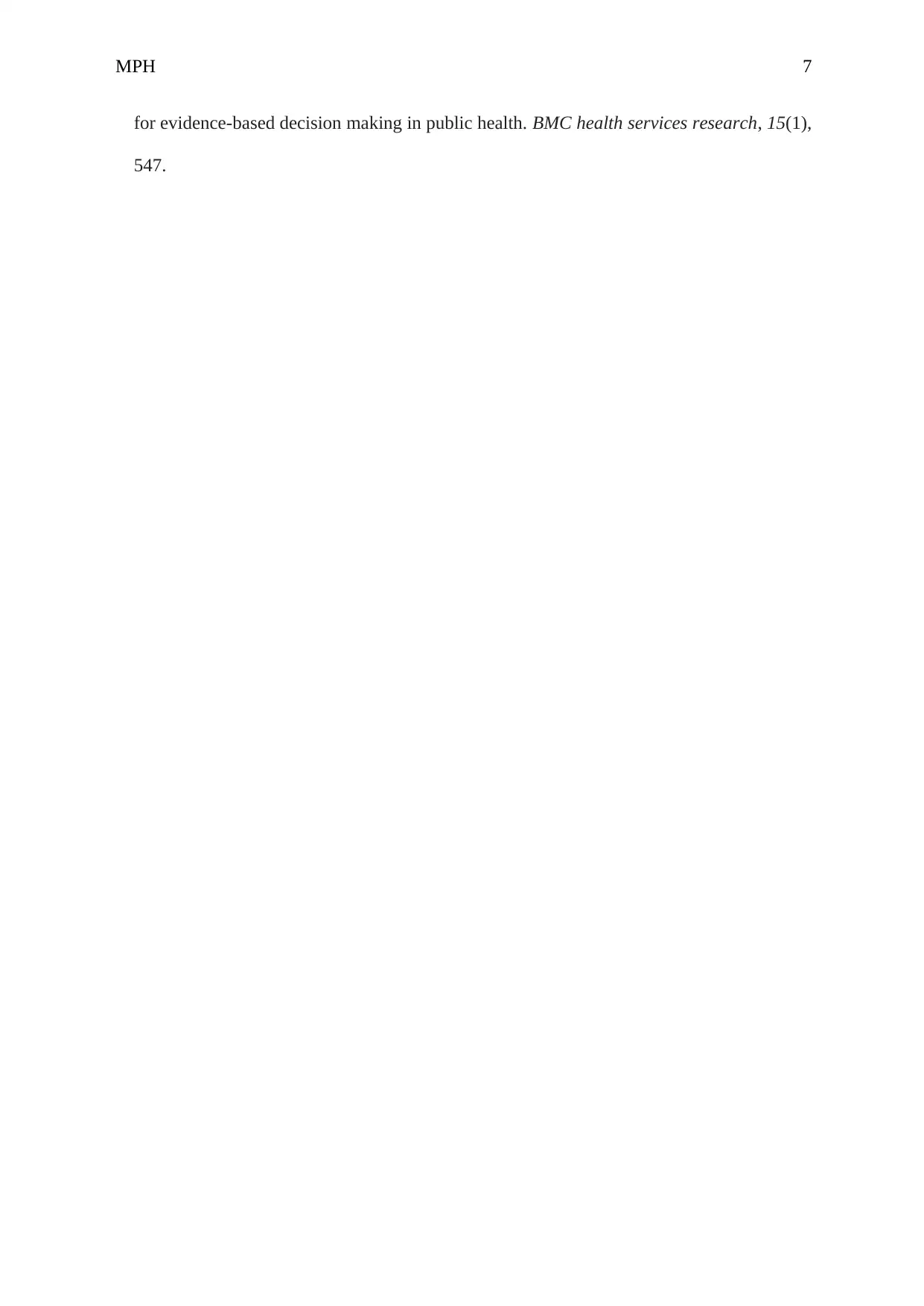
MPH 7
for evidence-based decision making in public health. BMC health services research, 15(1),
547.
for evidence-based decision making in public health. BMC health services research, 15(1),
547.
1 out of 7
Related Documents
Your All-in-One AI-Powered Toolkit for Academic Success.
+13062052269
info@desklib.com
Available 24*7 on WhatsApp / Email
![[object Object]](/_next/static/media/star-bottom.7253800d.svg)
Unlock your academic potential
Copyright © 2020–2026 A2Z Services. All Rights Reserved. Developed and managed by ZUCOL.





